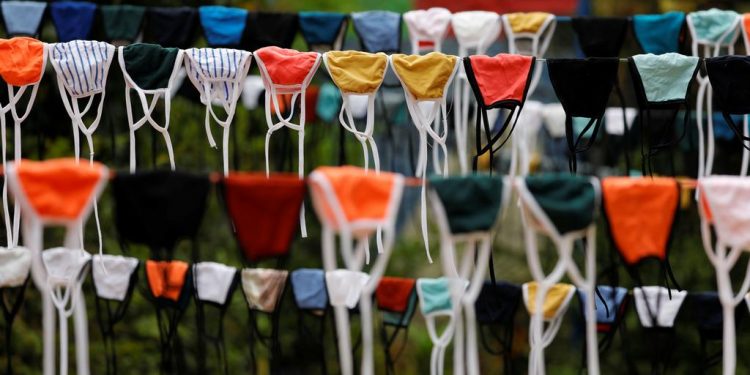With new life in the time of coronavirus, as with any outbreak, global travelers have the risk of exposure on their minds — as evidenced by masks on their faces.
Passing through any international terminal as of late, it’s impossible to ignore a sizable uptick in self-imposed faces. They represent not just wary passengers but also airport staff, flight attendants, and ground crew.
But many people still worry about this: do these little blue masks that people are wearing at the airport actually keep people from getting/giving viruses?
The practice remains unadvised by the Centers for Disease Control and Prevention, “CDC doesn’t currently recommend the use of face masks among the general public,” reads the most up-to-date FAQ on the federal agency’s website.
But that hasn’t stopped travelers from stocking up: Amazon is temporarily sold out of many of its top-selling disposable varieties; they’re easily spotted on faces in airports across the world.
How truly effective are masks, and when should people wear them?
A wide range of medical professionals told what travelers should know in the wake of the outbreak.
- A cover, but not a cure-all
“The regular kind of mask you’d find online is not all that helpful against any kind of virus,” warns Amy Shah, a double board-certified medical doctor in allergy and immunology. “Will it completely protect you? No. The best thing you can do is wash your hands frequently with water and antibacterial soap for at least 20 seconds — and to keep your immune system up”, – she says.
To that end, she offers disposable gloves as a more effective form of prevention when traveling than the stereotypical surgical mask. And as a more practical measure, she suggests assisting self-defense with lots of vitamin C in the form of food.
“Leafy greens are a great source, more so than eating a ton of oranges”, she says.
“Turmeric and vitamin D also work as immune-boosters.”
Medical face masks are often used during flu season or a virus outbreak. Demand for masks has skyrocketed amid the coronavirus outbreak.
- One size doesn’t fit all
If you’re of the “better safe than sorry” camp, remember to consider a mask’s size and rating.
“N-95 masks, which are used by health-care workers, would be the most effective,” says Richard Seidman, the chief medical officer of L.A. Care Health Plan.
“They are tighter-fitting and able to filter smaller airborne particles. Those found in drugstores don’t fit as well and can’t protect against viruses that might be expelled in a cough or sneeze.”
In a pinch, making sure the mask forms a tight seal around your nose and mouth is probably more important than the specific mask used.
The doctor recommends masks for people who are already sick, rather than those worried about coming down with something.
“Most studies have shown masks to be of greatest benefit to those that are actually sick, helping to prevent them from spreading an infection to others,” he says.
If you feel the symptoms of fever or a head cold, he recommends strapping one on.
It also has a sense for those susceptible to allergies or air pollutants; a mask is far more likely to ward off dust and pollen than airborne pathogens.
Common-sense precautions and practices are far more instrumental in the prevention of seasonal respiratory viruses like influenza.
Chief among them include washing your hands often, cleaning and disinfecting frequently touched objects and surfaces, and getting the flu shot.
- Don’t mask your best defense
Although the benefits of a mask are contentious, experts agree that the only definitive downside is a false sense of security.
In any sort of disease prevention, your own immune system is always the best weapon.



